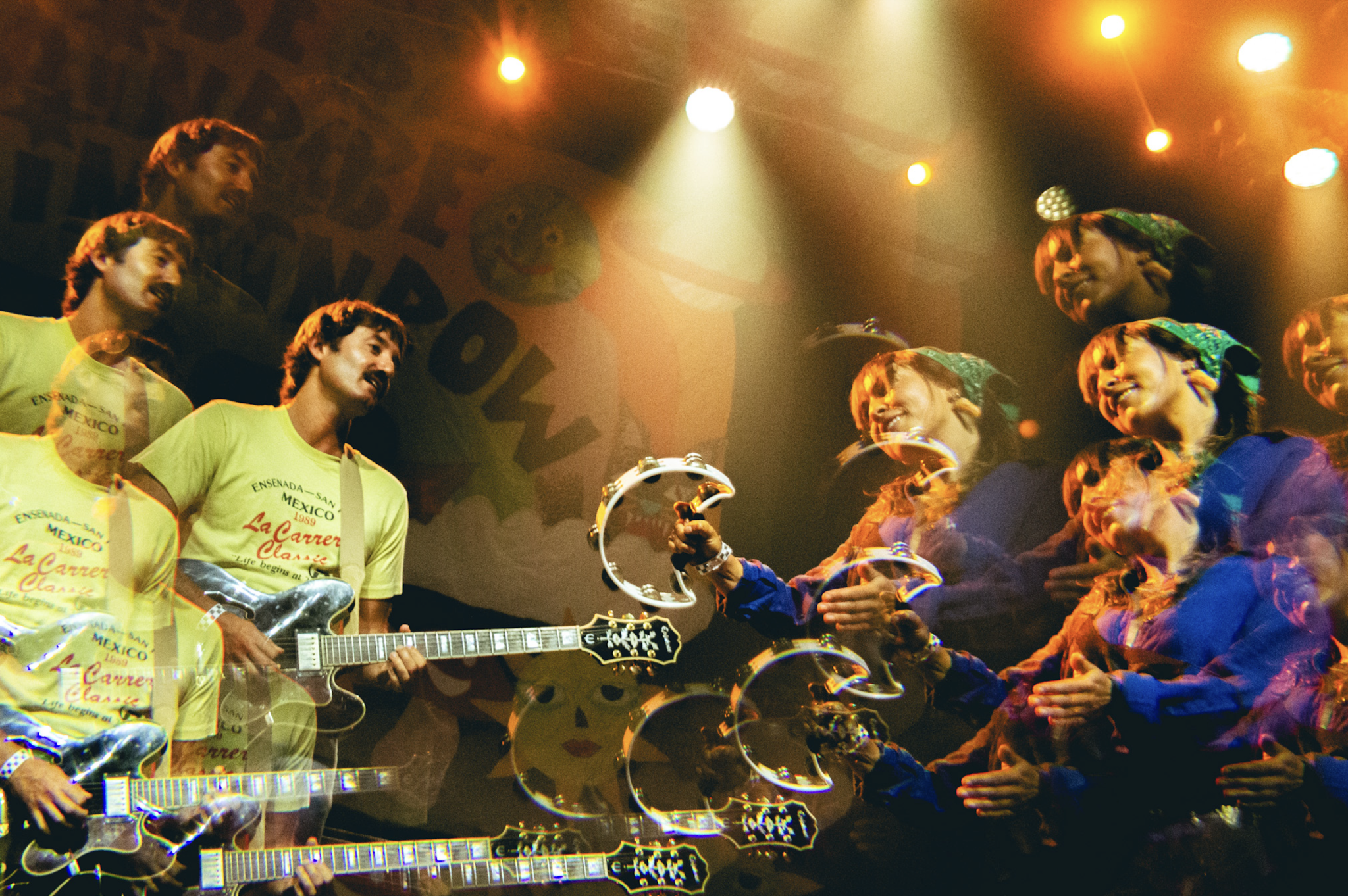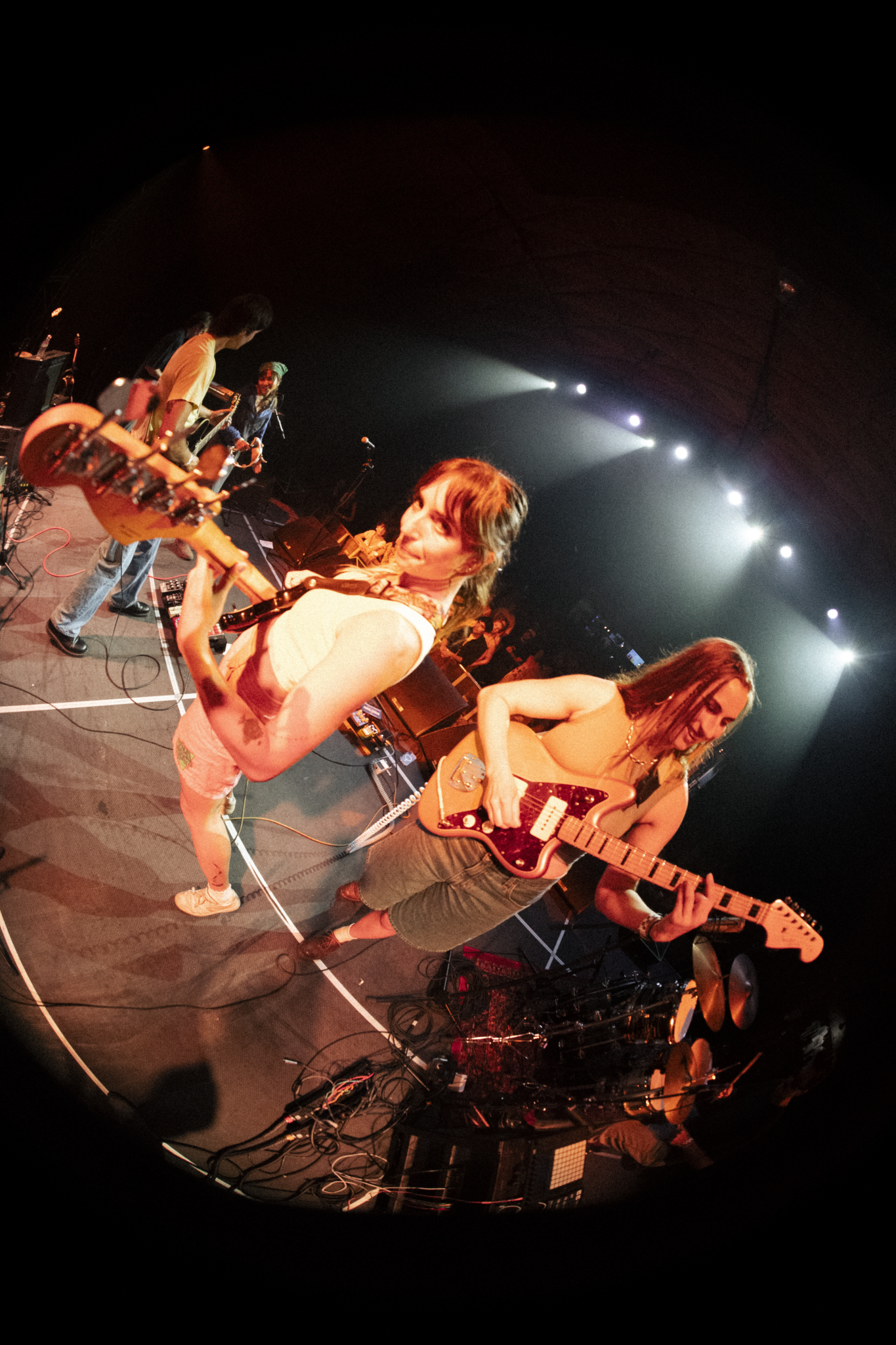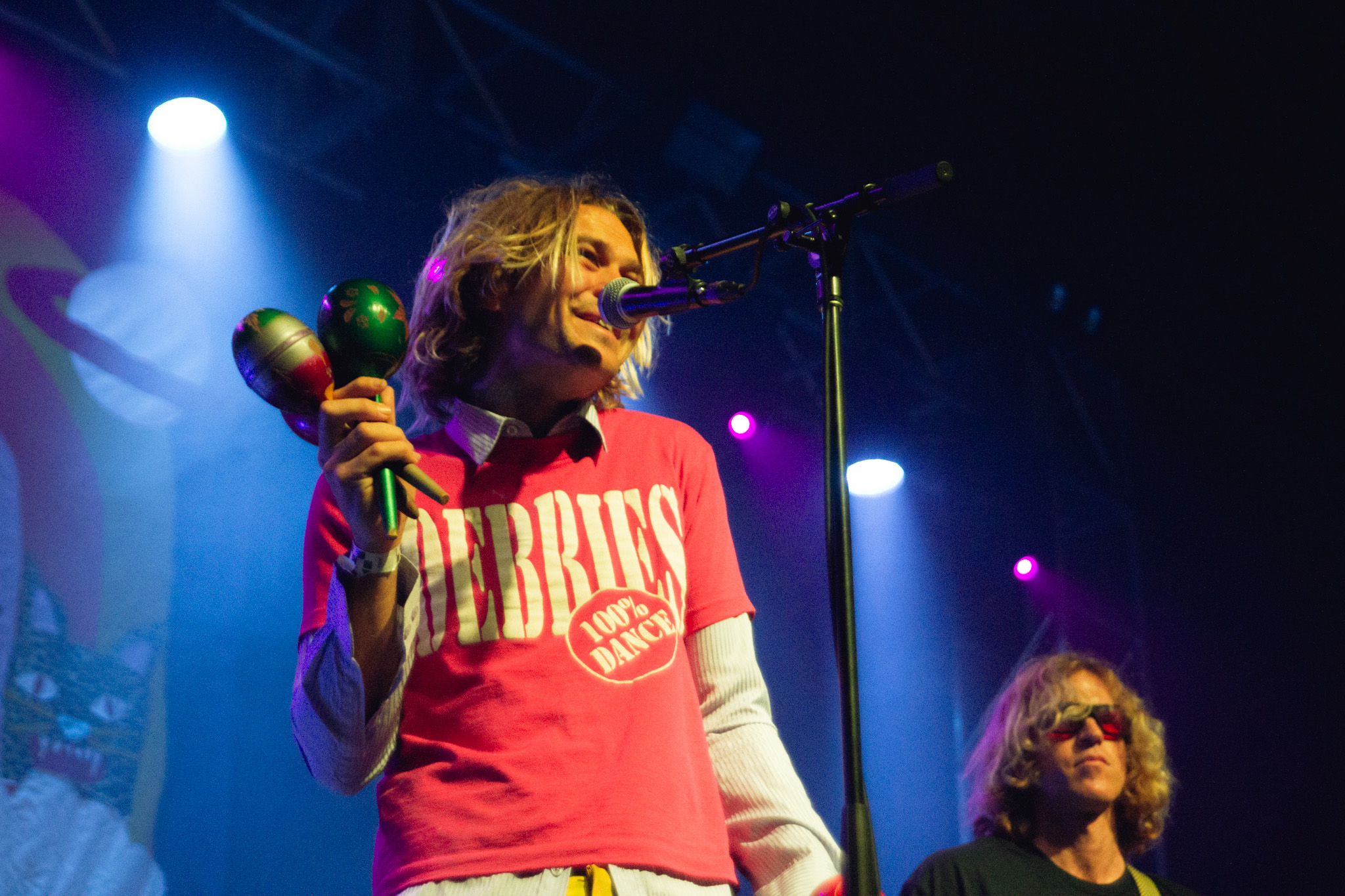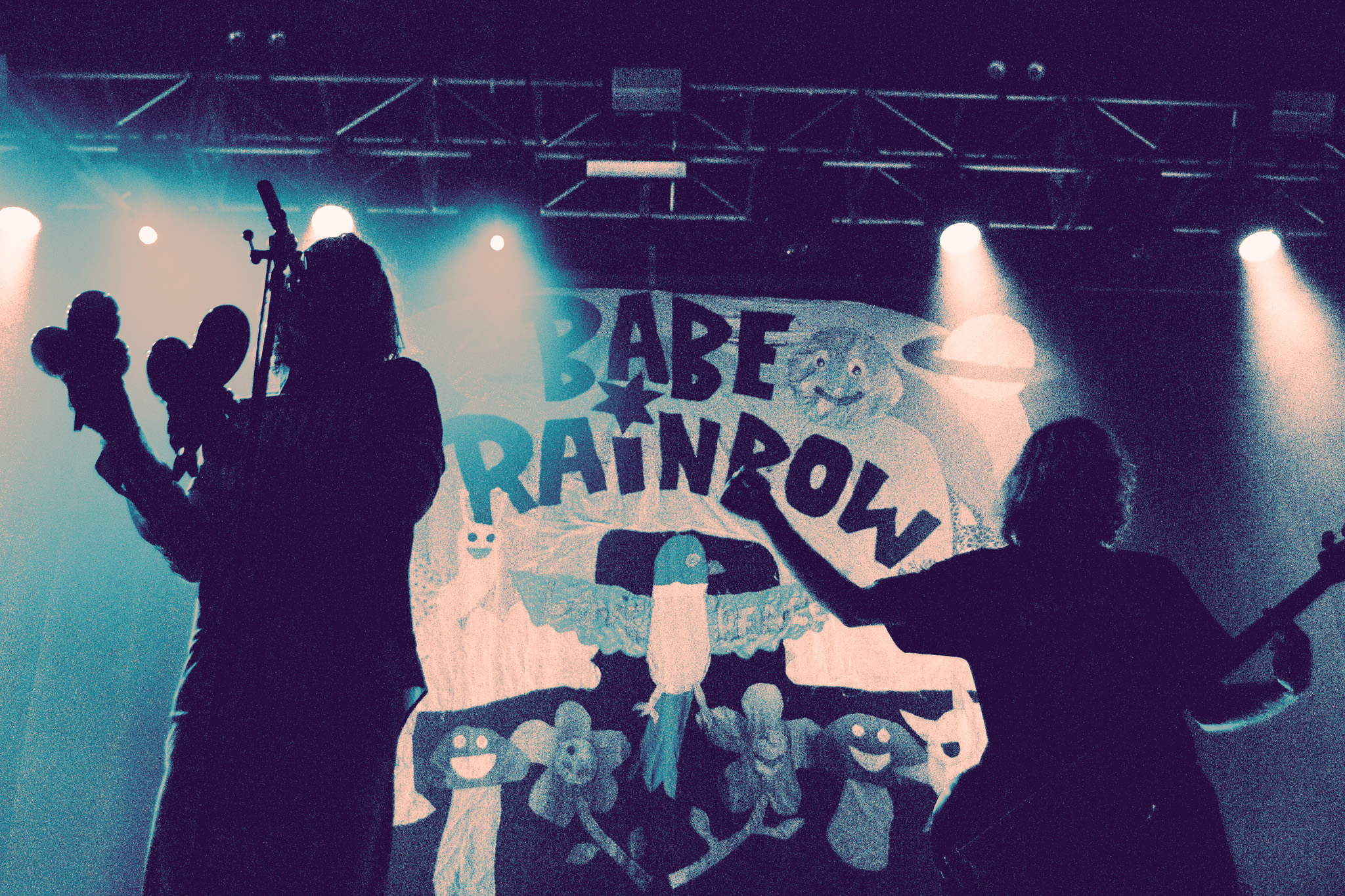I didn’t even have time to spit out my gum before we were brought into the greenroom by Queentide’s manager, Jack. It was like a scene from a movie — he checked his watch, told us we had 10 minutes and closed the door.
We were surrounded by the band, each member holding a burrito, as Bela Lafferty, who sings and rocks a tambourine, rolled her eyes and told us not to listen to Jack; we could have as much time as we needed. We were greeted with warm hugs and handshakes, offered a beer and told to pull up a chair. Immediately, their energy was contagious and their warm camaraderie apparent.

Queentide, the majority of whose members attended UC Santa Barbara, led an electric set opening for Babe Rainbow. (Courtesy of Avery Morgan)
Their immediate friendliness felt almost natural as a result of our similarities to them: Most of Queentide attended UC Santa Barbara, with the exception of Cameron Crabtree, their lead guitarist, who is from Santa Barbara but attended UC Santa Cruz. Formed in 2019 in Goleta, the band has performed together on a regular basis ever since, despite living in different cities and having other jobs.
“Yeah, it’s like a long distance relationship. It’s wild we’ve made it over the years,” Emma Vogan, who sings and plays bass and guitar, said. “Like Bela lived in Mexico for a while, Maddy [Dahm] lived in Canada for a while. I’ve moved to the honors school campus. Crazy. But like, we’ve always been able to make sacrifices or compromises, and we can work and come back together,” she said.
Their genre is referred to as “porch rock,” a descriptor that functions as a double meaning. One is an explanation of the band’s roots. “We just aggressively started practicing on the porch and playing music and learning songs, and me learning Maddy’s songs and Maddy learning mine. And that’s how we started,” Vogan said.
These porch practices started due to a deadline: Dahm, who sings, plays guitar and bass, and started the band, had booked a gig in downtown Santa Barbara but had no band yet. “And so I booked a show at M special and just slowly started recruiting people to play with me. And those are literally the people who are in this room,” Dahm said.
Both Dahm and Vogan explained their origin story in their own way. It is a quintessential illumination of the Isla Vista music scene. Vogan was one of the first to be recruited. “I remember it being at M. Special, and Maddy is like, ‘Hey, I got the gig.’ Like, ‘I know you play guitar. You want to play with me?’ And I was like, ‘Yeah, I guess.’ And then we had two months to come up with, like, a two-hour set,” Vogan said.
Lafferty was brought into the fold when Dahm saw her performing at an I.V. classic: the architectural masterpiece that is the geodesic dome house, known for its spherical shape and tenants who live up to living in a house so fascinating. “And then I saw Bella singing at a dome open mic one night. She’s really good,” Dahm said. This collection of musicians came together, alongside guitarist Crabtree and drummer Ryan Lykins, and they’ve been making music ever since.

Queentide’s contagious camaraderie was apparent both on and off the stage. (Courtesy of Jake Richards)
While the band did not form until after graduation, members of Queentide were involved in the I.V. music scene during their time in school. “I played in a couple other bands, actually, when I went to UCSB, that were sort of in the UCSB band scene,” Vogan said. “There’s one called Dad Clothes, and then another one called Nip Slip. That’s a lot of clothing malfunctions,” she said.
Queentide plays homage to their Isla Vista roots. Goleta residents near and far can appreciate the way the band has written songs for Goleta, rather than the better-known Santa Barbara. One of their songs, titled “West Goleta,” mentions Goleta countless times, as well as a shoutout to Devereaux Beach and finishing by saying the mantra, “Keep Goleta Country.”
The story behind that particular song again feels perfectly I.V. The song was written for friends of the band, who Vogan and Dahm lived with at times in Cheetah House. Once the boys moved out and lived near the Ellwood Mesa preserve, they began referring to that area as “West Goleta,” Dahm explained.
“We wrote a song for them, basically,” Dahm said. “And it’s kind of like a platonic love song about, like, how you have all these great guy friends, you know, you love them. They’re amazing, they’re gorgeous, but you would never date them. You know what I mean,” she added.
Their style of porch rock references both their roots of practicing on one and the unique sound they have come together to form. While they eventually moved from porch to living room, Dahm said there is a feeling of porch rock they seem to always return to.
“So even our songs that are a little bit grungier, I think we can still transition back into this kind of somewhat crunchy Americana thing. But I think it’s all cohesive. There’s this specific sound that’s all of our very unique sounds combined,” she said.
This collaboration of sound and style speaks to the individuality of the band and their ability to maintain their closeness while navigating the pushes and pulls of post-grad. Playing, on average, one show a month according to Vogan, Queentide performs up and down the coast of California.
All of this happens amongst their jobs outside the band. From science writing to science illustration, music industry, wildlife conservation and tequila industry jobs, the band can be an emblem to students everywhere for balancing personal love and passion and finding ways to make it all work beyond the golden glow of college.
They have advice for students, too. In fact, Vogan shared one of her best kept secrets. “The biggest secret is you don’t actually have to leave,” she said. She also said the key to a band’s continuous success is in passion and dedication.
“Everyone has to really want it if you want to stick together and do it after college,” she said. “And just keep it fun and keep it good vibes. That’s, I think, the hardest thing about it. Playing music and continuing music is keeping a band together. And a lot of that is a big group, collaborative project,” she added.
The band kept coming back to their emphasis on keeping friendship first. They shared memories from their international tour and a toss up with a bout of norovirus, and it is apparent that the band’s style and success is a large reflection of the personalities and their genuine connection with one another.
Their most recent release is a single called “burn,” which Vogan describes as a deeply collaborative song, and her current favorite. “This one we all wrote together, really raw from a jam,” she said. “So it has a different sound that’s just like, yeah, it sounds different. It’s a real sprinkle of everybody. It’s our chaos all the time. Yeah, it’s my favorite right now,” she said.
Their physical stage presence was electric, and we had the opportunity to dance our hearts out right up front. With waves and smiles from the band, it felt like we just made five new friends. But maybe that’s just the magic and chemistry of a place like Isla Vista and the people it produces.
And Queentide was just the opener. While their energy was enough to headline the entire show, Babe Rainbow hit the audience with a second groovy wave. After the show, we were lucky enough to catch frontman and vocalist, Angus Dowling, around the back. His bandmates, Jack Crowther (guitar), Elliot O’Reilly (bass) and Miles Myjavec (drums) were scattered around the back lot of Ventura Music Hall, unwinding after the high energy show.

Angus Dowling, vocalist of Babe Rainbow, at Ventura Music Hall. (Courtesy of Avery Morgan)
The band hit Ventura after their show in San Francisco, two of the four California cities on their baby tour. They stopped in Pismo Beach on the way down, hungover and eager to swim, on par with the two things that seem to define Babe Rainbow: rock and roll and the beach.
“We went to Pismo on the way down. Everyone was hungover and we were driving down and we immediately pulled down and walked down the cliffs and just dove in the water. We dove in the water and we were all just swimming around for ages,” Dowling said.
Despite their home break being across the world in Byron Bay, Australia, Dowling and the rest of the band cannot seem to get more Californian (except for the thick Australian accents). Playing shows in California goes hand-in-hand with taking advantage of a surf trip, and they’ve hit all the spots: Ocean Beach, Costa Mesa, Malibu and Topanga; he even knew about Mollusk Surf Shop. They wanted to stop at Rincon on the way down but, alas, they had a show to play.
And a show it was. Combining all the best things that are inherently “Californian” — psychedelic rock, Vans shoes, sun-bleached hair and a dancing crowd — Babe Rainbow is not to be missed. Dowling recounted his favorite song of the evening, “Zeitgeist,” released in 2021 on their album “Changing Colours.” While the song was originally difficult to play live due to the complicated drum tracks, the band figured out to include an electronic, more simplified drum track, allowing the song to make its live show resurgence.
“You can feel this spacey song. It makes it feel spacey and not in a dark way, but like druggy or something. I’ve kind of been loving that the last couple shows,” Dowling said.
While “Zeitgeist” may have been Dowling’s favorite, “Johny Says Stay Cool” was the crowd’s favorite. A song that can be heard wafting out of Isla Vista’s many band shows, “Johny Says Stay Cool” embodies everything that is I.V. And so, who is Johny?
“I met this old guy in the surf, this English guy, and he asked me to come up to this farm near where we lived, to help him put this timber bed together that he couldn’t do on his own … I just started going up there every day,” Dowling said.
Johny’s vegetable farm, full of spinach, kale, potatoes, guava and citrus trees, became the workplace of the three musicians (Dowling, Crowther, O’Reilly), and the grounds for the friendship that led to one of Babe Rainbow’s catchiest songs.
“It was just a funny moment of your life when it just happens naturally. We were there for years and years, and Jack ended up meeting this girl, and he and her ended up living there for a while,” Dowling said.
Babe Rainbow wrote “Johny Stays Stay Cool” while living in a squat in Paris — a “nice squat,” to be exact. Dowling and Babe Rainbow’s first time playing in the United States was in 2015, when they were opening for the The Growlers, and there they met a French band who invited them to Paris. There wasn’t any other option except saying yes.
“We had nothing going on and we were like, ‘yeah.’ They flew us there and we just chilled with them and ended up staying in this squat in Paris for ages and it was just the most bizarre time. And that ‘Johny Be Cool’ song was made in this random place,” Dowling said.

Babe Rainbow’s set concluded with “Johny Says Stay Cool,” an Isla Vista staple. (Courtesy of Avery Morgan)
It’s no question that Babe Rainbow’s songs overflow with the beach bum energy that Dowling exuberates — a product of living on the beach and on farms, toasted by both the warm California and Australia suns every day. According to Dowling, the place influences almost all of their songs. Their recording studio, for example, is the reason their songs feel so fresh. On a banana plantation up the creek from another farm, the sound of rushing water can be heard on the other side of the recording studio walls. They go from a swimming hole to recording part of a song and back to swimming.
“I felt like [the location] had heaps to do with those songs,” Dowling said.
While the location makes the songs, there is still room for musical inspirations. Dowling particularly loves Leonard Cohen, the bass player from Tame Impala and his bandmate, Crowther, who he calls “Cool Breeze.”
“He inspires me a lot, an insane musician. You know when you are sitting around, hanging out, and someone can play something and they’re not like playing something? It’s more sound tracking just in this way if there’s a guitar or piano or something … suddenly there’s music playing,” Dowling said. He added that if Crowther was sitting next to him right now, he would be mindlessly strumming a guitar, perhaps sowing the seedlings for the next Babe Rainbow track.
As the band first came to the United States at 18 years old, they had, as Dowling would say, heaps of advice for students hoping to break into the industry.
“Sometimes I feel like it’s good to concentrate on the recording and songs themselves … But then in another way, you wouldn’t get to the same place that you would if you weren’t being forced to be on the road … It’s a combination,” Dowling said.
As we left Dowling to make our way back to Isla Vista, thanking him for taking time out of his post-show smoke session to chat with two college students, he made sure to tell us to stay cool. Babe Rainbow says stay cool.
A version of this article appeared on p. 19 of the Oct. 2, 2025 print edition of the Daily Nexus.




















